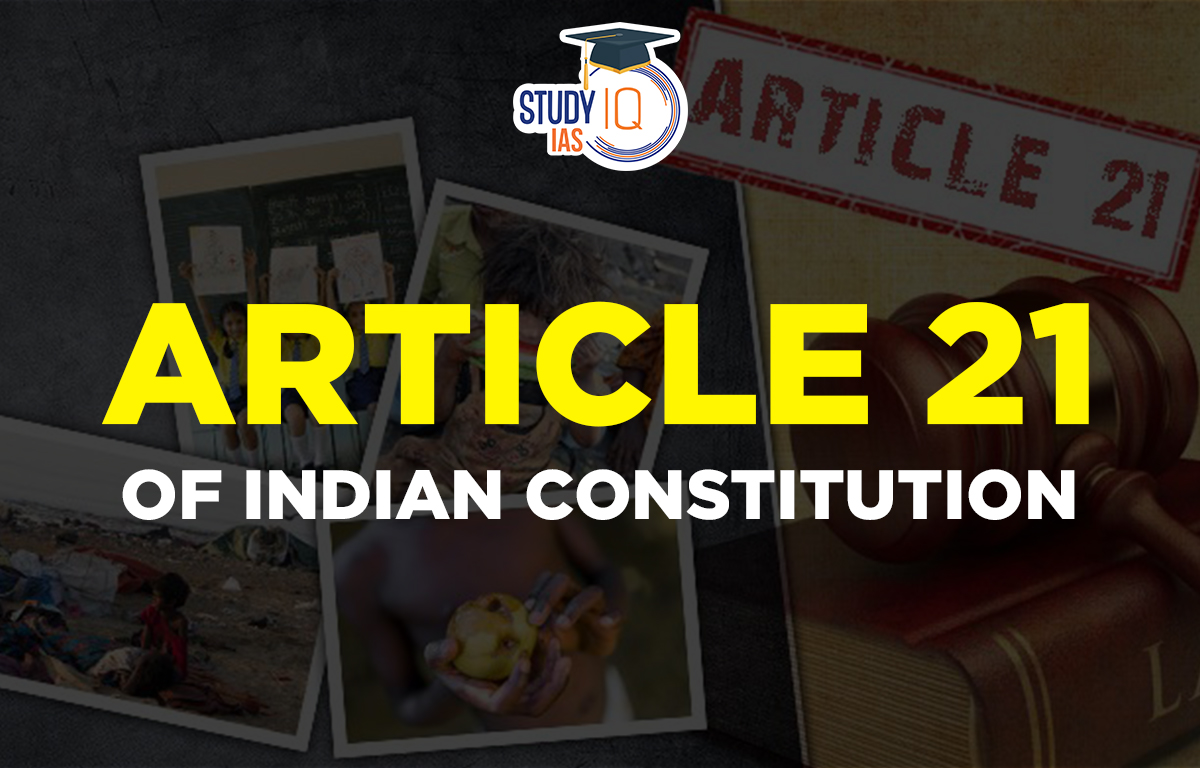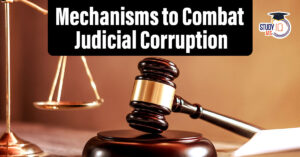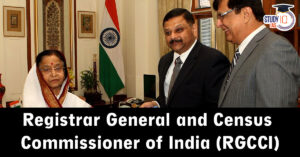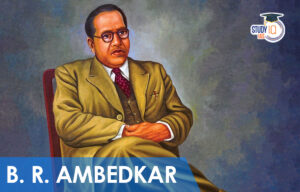Table of Contents
Article 21 of Indian Constitution
Justice P. Bhagwati stated that Article 21 “embodies a fundamental value of supreme importance in a democratic society” in Francis Coralie Mullin v. The Administrator (1981). Additionally, Article 21 was described by Justice Iyer as “the procedural Magna Carta protecting life and liberty.”
Article 21 ensures that “No individual shall be bared of life and liberty except to the procedure established by the law”, it also forbids the denial of rights in accordance with legal processes. Article 21 is the core of the Indian Constitution. Article 21 also covers important rights such as equality before the law, freedom of speech and expression, as well as freedom of religion and culture. Every Indian citizen is covered under Article 21. Foreign nationals also have been protected under this article. The two categories of rights in Article 21 are:
- Right to Life
- Right to Personal Liberty
Read More: Right to Freedom
Right to Life under Article 21 of Indian Constitution
‘Life’ under Article 21 of the Indian Constitution should not merely be taken as the physical act of breathing. It does not imply continual toil or a life of simple animal existence. It covers a far wider range of issues, such as the right to a decent standard of living, the right to a means of support, the right to health, the right to clean air, etc.
The Right to Life is necessary to our very existence and without which we cannot exist as humans, the right to life embraces all those aspects of life that give a man’s life meaning, fulfilment, and value. Thus, the bare essentials, minimum requirements, and fundamental needs of an individual are derived from the fundamental principle of the right to life.
Kharak Singh v. State of Uttar Pradesh 1963
Supreme court held that the term “life” is employed in this context, more than only animal existence is indicated. The prohibition against its loss applies to all the limbs and faculties that are used to enjoy life. The provision forbids the mutilation of the body, including the removal of an eye, an armoured leg, or any other organ that allows communication between the soul and the outside world.
Read More: Article 19 of Indian Constitution
Right to Personal Liberty under Article 21 of Indian Constitution
According to the Indian Constitution, the sole intention of laws made is to preserve the rights of the citizens. In light of it, Supreme Court under Article 32 is considered as the guardian and the protector of fundamental rights. We have all of the legally recognised fundamental rights as Indian citizens. Hence, if an individual’s fundamental rights are violated, the Supreme Court can be used to enforce them.
The Supreme Court has the authority to exercise judicial review by issuing writs or orders to enforce fundamental rights because the right to a constitutional remedy is a component of those rights. The Supreme Court has established the legal system as a pillar of individual liberty.
Because it is the sole provider in the Indian Constitution that addresses the right to life or any other right that belongs to human beings, Article 32 is considered the “heart” and “soul” of the Indian Constitution.
The most valuable piece of legislation is India’s Constitution. The Magna Carta serves as the foundation for personal liberty. Personal liberty is never susceptible to detention, arrest, or any other kind of bodily restraint. The fundamental component of personal liberty is positivity.
Article 21 Interpretations by SC in Various Cases
Article 21 of the Indian Constitution, which provides for the right to life and personal liberty, has been interpreted in various ways by the Supreme Court of India in various landmark cases. Some of these cases include:
AK Gopalan v. State of Madras 1950
Article 21 was somewhat limited in its application before the 1950s. In this decision, the SC determined that the phrase “procedure established by law” as used in the Constitution had British-style personal liberty, not American-style “due process” at its core.
Maneka Gandhi vs Union of India
In this instance, Manenka Gandhi received a passport from the passport office for an international trip. However, the Regional Passport Officer in Delhi notified the petitioner that the Government of India made the decision to accept the passport. The petitioner was required to return her passport within seven days for this reason. The passport was eventually denied by the government because, according to them, it went against the interests of the general population. Then the petitioner filed a writ petition objecting to the government’s refusal to seize the passport.
The Supreme Court reinterpreted Article 21 in the Maneka Gandhi case by declaring that the right to life encompasses more than just the physical and includes the right to live with dignity.
Francis Coralie Mullin vs. Union Territory of Delhi 1981
Francis Coralie Mullin vs. Union Territory of Delhi is a 1981 Indian Supreme Court case. The case dealt with the issue of whether the Union Territory of Delhi was exempt from paying minimum wages to its employees under the Minimum Wages Act 1948. The Supreme Court held that the Union Territory of Delhi was not exempt from paying minimum wages and that it was obligated to pay its employees the minimum wages as determined under the act. In this decision, the court ruled that any mechanism used to revoke someone’s right to life or liberty must be reasonable, fair, and just—not capricious, capricious, or fantastical.
Olga Tellis vs. Bombay Municipal Corporation 1985
Olga Tellis vs. Bombay Municipal Corporation is a 1985 Indian Supreme Court case. The case dealt with the issue of whether pavement dwellers in Mumbai had a right to livelihood and adequate housing. The Supreme Court held that the right to life under Article 21 of the Indian Constitution included the right to livelihood and adequate housing and that the Bombay Municipal Corporation was obligated to provide basic amenities, including water and sanitation, to pavement dwellers.
This case established the principle of the right to life as a comprehensive right that encompasses the right to basic necessities such as food, shelter, and clothing. This case reaffirmed the earlier stance that any action that would violate a person’s fundamental rights should adhere to the rules of justice and fair play.
Unni Krishnan vs. State of Andhra Pradesh 1993
Unni Krishnan vs. State of Andhra Pradesh is a 1993 Indian Supreme Court case. The case dealt with the issue of whether the right to education was a fundamental right under the Indian Constitution. The Supreme Court held that the right to education was a fundamental right under Article 21 of the Indian Constitution, which guaranteed the right to life and personal liberty.
The court stated that education was an integral part of the right to life and that the state was obligated to provide free and compulsory education to children between the ages of 6 and 14. This case is considered a landmark decision in Indian constitutional history, as it established education as a fundamental right in India. The SC supported the broad meaning of the right to life in this instance.
Read More: Article 20 of the Indian Constitution
Article 21 of Indian Constitution Scope
Article 21 of the Indian Constitution provides for the right to life and personal liberty. The scope of Article 21 is broad and has been interpreted by the Supreme Court of India in various landmark cases over the years.
Right to Die (Euthanesia)
A person has the right to choose to end their life under any conditions or to consent to euthanasia voluntarily. However, the right to die does not apply to coerced suicide. The right to death is freedom wholly dependent on people.
In Common Cause vs Union of India 2018, SC gave its legal sanctity to Passive Euthanasia. This verdict was made in the line with the case of Aruna Shanbaug who until her death in 2015 lived her life in a vegetative state for more than 4 decades. Although Active euthanasia is not yet legal in India.
Although there is no legal backing for euthanasia in India, passive euthanasia is permitted under strict guidelines, as the individual must give consent to a living will and the patient should either be in a vegetative state or terminally ill.
Right to be forgotten (RTBF)
The right to be forgotten refers to the ability to request the removal of personally identifiable information that is publicly accessible from databases, websites, search engines, and other social platforms once the information is not required.
There is no law in India that particularly addresses RTBF. However, the now-retracted Personal Data Protection Bill (PDPB), 2019, included RTBF-related measures. The Information Technology Rules, 2011, which regulate digital data, likewise don’t have any RTBF-related clauses.
The Supreme Court in K.S. Puttaswamy v. Union of India, 2017 recognised RTBF as a component of the rights to life and privacy under Article 21 in this precedent-setting judgement. The RTBF was prohibited from being used if the material in question was needed for the following purposes, according to SC:
- Exercising one’s freedom of expression and information.
- Compliance with legal obligations.
- The performance of responsibility for the public’s welfare or health.
- Protection of privacy in the public interest.
- For statistical purposes, for scientific or historical research, or both; or
- Establishment, carrying out, or defending legal claims.
Right to the Internet as Human Right
All people must have access to the internet in order to exercise their right to freedom of speech, opinion, and other essential human rights.
Supreme Court in Sabu Mathew George v. Union of India and Ors, 2018 declared that the Right to Access Internet is a basic fundamental right, which could not be curtailed at any cost, except for when it “encroaches into the boundary of illegality.”
Following the Sabu Mathew judgement in this case, the Kerala High Court in Faheema Shirin v. State of Kerala, 2020 also declared the right to Internet access as a fundamental right.
List of Rights Under Article 21 Interpreted by Supreme Court
The Supreme Court through its various judgements has declared the following rights as part of Article 21:
| List of Rights Under Article 21 | |
|
|
As the current form of this article is evolving on a case-by-case basis, many more rights are being added to this list with each passing judgement. This also depicts the flexibility of the Indian Constitution.
Read about: Article 14 of Indian Constitution
Article 21 of Indian Constitution UPSC
Anyone may submit a petition to the Supreme Court if they believe that a public official or government official has violated their fundamental rights. The Magna Carta period of history is referenced in Article 21 of the Indian Constitution. First, the Magna Carta is the basis of our Indian Constitution. The Constitution at that time gives the judiciary a very restricted role. However, the judiciary now plays a significant part in our Indian Constitution.
The Indian judiciary, which is listed in the Indian Constitution, is responsible for enforcing the law. According to the Indian Constitution, every Indian citizen is treated equally. Every right guaranteed by the Indian constitution is open to all.
Read about: Article 15 of Indian Constitution


 Mechanisms to Combat Judicial Corruption...
Mechanisms to Combat Judicial Corruption...
 Registrar General and Census Commissione...
Registrar General and Census Commissione...
 Ambedkar Jayanti 2025: Biography, Legacy...
Ambedkar Jayanti 2025: Biography, Legacy...





















